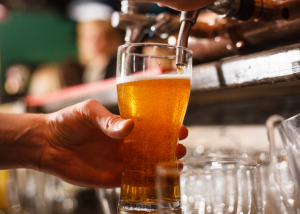Even if beers just have an ABV of 4% to 6%, still that’s alcohol, and you can gain tolerance as you drink more each day. It can start from your weekend binge drinking, and maybe later, you’ll have two to three beers each night.
Basically, you get a beer addiction when you can’t live a day without a sip or a glass of it. However, the most challenging part will be knowing and accepting that you’re addicted to it.
Then you’ll ask yourself, “Can I cut back on my own? Will that be enough?” Honestly, a lot of alcoholics experienced a difficult time overcoming their beer addiction on their own, so they seek help from a doctor or an addiction specialist.
How Can You Tell If You’re Addicted to Beer?
Are you looking for signs of beer addiction? Here are the top signs that you’re addicted to beer or any alcoholic beverages:
 Looking and feeling intoxicated every day
Looking and feeling intoxicated every day- You cannot miss a day without drinking a beer
- Anxiety and depression
- Lost of enthusiasm from your daily activities
- Feeling irritable and restless if you cannot drink
- You have the urge to drink more to feel the same effects
- Being secretive with your drinking habits
How Many Beers Per Day Until You’re Considered An Alcoholic?
Alcohol dependence can start from your binge drinking on weekends, and that means having five or more drinks for males, while four or more drinks for females in less than two hours. This can highly contribute to alcohol use disorder.
Additionally, you have a beer addiction when you have four or more drinks daily or around 14 drinks or more in a week for men. Whereas for women, that’ll be three drinks daily or seven drinks or more per week.
How Beer Addiction Can Be Treated?
If you’re planning on achieving sobriety from your beer drinking, then consult with a doctor or addiction specialist since they can personalize your treatment program.
Their alcohol recovery program varies from one patient to another, yet here are the main components of this plan:
Detoxification
This process can be either done outpatient or inpatient, depending on the severity of your alcoholism.
If your beer addiction is severe, then it’s safer to go for an inpatient detoxification program. In there, you’ll get 24/7 medical assistance, in case your withdrawal signs are intensely painful.
Here are some of the common alcohol withdrawal symptoms:
- Tremors
- Confusion
- Vomiting
- Headache
- Sleeplessness
- Hallucinations
Prescription Medication
The doctor will also give you prescribed medicines that’ll help you cut off from beer drinking and ease any pain from the withdrawal. Below are some of the common medications given to patients:
- Naltrexone: This prevents your brain from feeling the euphoric and positive feeling from drinking alcohol. Eventually, it will discourage you from beer drinking since you don’t feel anything from ingesting it.
- Disulfiram: This medicine will give you discomfort upon drinking any alcoholic beverages. You’ll have nausea, vomiting, and headaches when your body intakes alcohol.
- Acamprosate: It will help bring balance in your brain chemicals and hormones, which have been altered due to alcohol.
Behavioral Therapy
 Treating the physical damage of beer addiction is not enough since it’s also a behavioral problem. Fortunately, you’ll be given a counselor or therapist who’ll help you develop a positive and healthy coping mechanism.
Treating the physical damage of beer addiction is not enough since it’s also a behavioral problem. Fortunately, you’ll be given a counselor or therapist who’ll help you develop a positive and healthy coping mechanism.
Even when you’re faced with a trigger, you can positively handle it with ease without reverting to drinking.
Additionally, they will also help you devise a healthy daily routine that’ll foster your holistic welfare.
Support Group Therapy
It’s also part of the treatment that you’ll be included in a group of patients with the same condition. Each one will be given a chance to share their positive insights in overcoming their alcohol and beer addiction.
This helps you gain confidence and wisdom from the sharing of experiences of all members in the group therapy. Moreover, there will be times when you’ll do community extension services to show your sobriety and determination of being part of the community again.
What Happens To Your Body When You Stop Drinking?
Have you heard of the “Dry January”? Well, you can start the year right by abstaining from alcohol for 30 days in the first month of the year.
It’s a great kick-off considering the many bottles of beer or shots of vodka you had from Christmas, right? Moreover, you’ll gain many health benefits from cutting back, which include the following:
1. Healing Time for Your Liver
One of the main causes of death among heavy drinkers is cirrhosis. Your liver develops scars due to excessive alcohol consumption, and cirrhosis is a final-stage liver disease.
Additionally, alcoholism also leads to fatty liver, which also adds a burden to the normal operation of your liver.
Consequently, when you cut off from drinking, you’re giving your liver time to relax and heal, thereby avoiding these liver diseases.
2. Cancer Prevention
Besides cirrhosis and fatty liver, beer addiction and alcoholism lead to the formation of other cancer diseases, which include the following:
- Esophageal cancer
- Head and neck cancer
- Breast cancer
- Colorectal cancer
Alcohol or beer may cause cancer since as it gets into your body and is digested, it produces acetaldehyde, which damages your healthy cells. Considering this, it’s for your own welfare when you stop drinking alcoholic beverages.
3. Losing Weight
 Well, stopping from drinking will not directly cut off 10 pounds of your weight, but it helps since most alcoholic beverages contain calories.
Well, stopping from drinking will not directly cut off 10 pounds of your weight, but it helps since most alcoholic beverages contain calories.
Wines and beers are the most common drinks taken by individuals and groups, and these drinks contain around 90 to 200 calories per glass.
Before you might be having five glasses of beer so that’s around 500 calories added to your body. When you stop drinking, you’re actually avoiding 500 calories without going to the gym.
4. Preventing any heart-related problems
When you drink in moderation, the alcohol can still be digested by the dehydrogenase enzyme in your liver. However, when you excessively drink, then it’ll be digested by another enzyme, which produces cholesterol and free radicals.
As time goes on, this could lead to cardiovascular diseases and cancer, so it’s best to just avoid excessive drinking for your stomach’s sake.
5. Preventing memory loss and brain diseases
When you’re highly intoxicated with alcohol, it could cause memory loss and brain dysfunction. Alcohol can depress your brain, thereby, you’ll lose muscle coordination when you’re drunk.
Want to Overcome Your Beer Addiction Today?
It’s truly difficult for you to gain sobriety from alcoholism, especially when you’re doing it alone. You need to reach out and seek advice from seasoned doctors or addiction specialists since they can better understand you and give you a comprehensive recovery program.
Take time to accept your limitations and weaknesses from beer drinking, as it’s the first step towards any treatment. After that, find a reliable alcohol rehab facility near you and inquire about their services.
